How Similar are Rural Maine and Rural China? (Part II)
In which I interview a Senator, score some juicy (?) quotes, and try to have a Thoughtful Conclusion
This is the second part of my investigation into the economic development of Northern Maine (my homeland) and an attempt to compare it to the economic development of rural China. In Part I, we discussed the region’s overall economic decline, the crippling labor shortage, and efforts of local public-private partnership organizations to support our communities to develop and rebuild. In this section, we’ll talk about tourism, politics, and search for some insight in the conclusion.
Chapter 4: What About Tourism?
Besides lobbying to bring in employers, Jon Gulliver at the Northern Maine Development Commission told me that a key part of NMDC’s work in northern Maine is helping communities position themselves better for tourism. Although tourism is booming in Maine overall, reaching almost 8 billion USD in spending last year, my home of Aroostook County only sees a tiny fraction of that - just 2 or 3%. Most of those dollars go to the Maine coast, or outdoor recreation at inland lakes farther south. But we get a bit.
Tourism is basically a three-season affair in Aroostook. We get about 3-4 months of camping and fishing in the summer, 3-4 months of snowmobiling, skiing, and ice fishing in the winter, 1-2 months of hunting and leaf watching in the fall, and 1-2 months of downtime in the spring (also known as “mud season” locally, for reasons that should be obvious). According to a local news report citing the Maine State Office of Tourism, Aroostook’s tourism revenue is strongest (by a small margin) in the summer (a surprise to me).
The same news report went on to speculate that agri-tourism could be a potentially untapped opportunity for Aroostook, and that more resources should be put into developing this sector. The concept of agri-tourism focuses on connecting farming/ agriculture with tourism, by bringing visitors to a farm or ranch to spend money. I think Aroostook is perfect for this, but it will require a leap of faith from some entrepreneurial minds with more of that “if we build it, they will come” thinking. It would take an adjustment to how locals see themselves and their livelihoods…they are accustomed to farming for food…farming out of practicality…not farming so that nature-starved urbanites can get eco-titillated. But it pays.
China’s trying something very similar right now as part of its Rural Rejuvenation campaign. If China’s approach works well, it could become a great case study in a few years. Until we see how it works, it can’t really serve as a model of success yet. But, it is interesting:

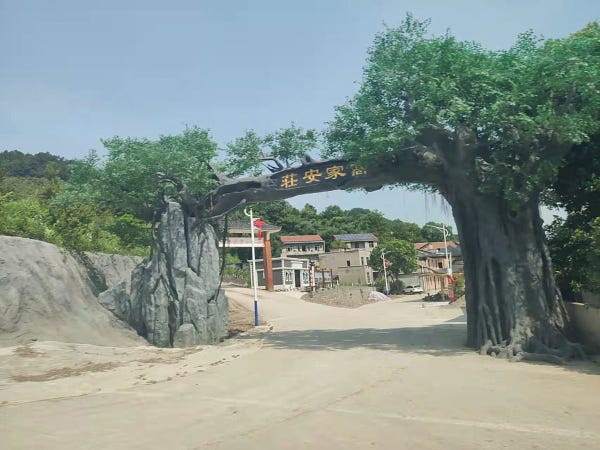
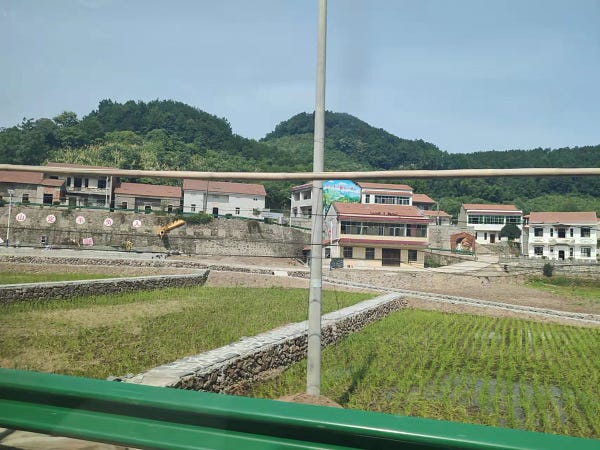
Besides newfangled agri-tourism, what about “regular” sport and recreational tourism? Camping, fishing, hiking, hunting, snowshoeing, skiing, snowmobiling…Aroostook has great resources for all of that. Could expansion of these classic tourism draws be the solution that saves northern Maine?
It’s possible…in theory. But to be honest, Aroostook doesn’t really have a competitive advantage for these things versus the rest of the state. Of course, we have gorgeous lakes and rivers and forests, but frankly the entire state is completely stuffed with gorgeous lakes and rivers and forests. Sure, we have friendly locals and a peaceful, quiet way of life, offering respite from the frantic bustle of the cities, but that’s also true for most of the state….
At the end of the day, camping or hunting destinations in the central and southern part of the state are much easier to get to…and are located in larger communities that have more to offer to tourists in terms of local festivals, dining, and shopping. Although northern Maine does have its share of quirky local festivals and events, the dining and shopping options up here are likely to underwhelm - remember that thanks to the labor shortage I discussed in Part I, we can barely keep restaurants open!
Before visiting NMDC, I stopped in at the Aroostook Centre Mall in Presque Isle. With a population of 8800, Presque Isle is the largest city in Aroostook County (although its population has declined over 15% since 1990). Visiting the mall, I was shocked at how empty it was - it was a ghost mall, like something you’d see in China. The key difference is that Maine’s ghost infrastructure is post-people, while China’s is pre-people.
I remember when I went to the mall as a kid that the food court would be so busy, you’d have to walk around for 10 minutes with your tray waiting for a seat to open up. Now, the whole mall has less than five stores open and the food court has just one lonely restaurant left (a Chinese place, ironically, which you can spot in the photo below).

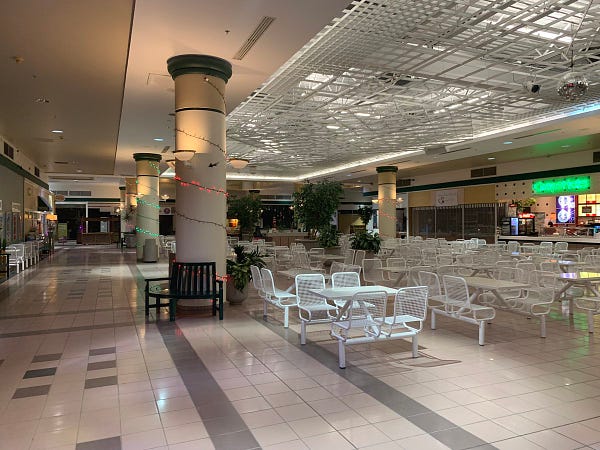
The Chinese restaurant owner’s name is Winnie and she’s from Hong Kong, via San Francisco. From behind the cash register, she told me she’s watched all her neighbors close, one by one, as the mall foot traffic dried up over the years. But, she still gets business from loyal customers who come to the mall just to pick up takeout from her restaurant, the only light in an otherwise dark food court.
I ask Winnie if she would consider opening a standalone restaurant outside the mall if it closed down. “No…I wouldn’t” she says. “I’m tired. My daughter doesn’t want to work here. She’s studying in Hong Kong. When this mall is done, I’m done.”
I wonder if the Chinese restaurants in the state have survived the labor shortage while so many other places have failed because they have the option to bring in extended family members from back home? It’s a plausible theory I think.

A nearby mall cleaning staff who looked to be in her mid-20s told me she blames the nearby Walmart for the decline of the mall.
“First we lost Kmart, then Sears, and now there’s only the JCPenney left. And I don’t know even know who shops at JCPenney…I can’t believe they’re still open….Everything else in here closed…I guess there’s no customers…It’s really a shame…We don’t even have a mall anymore…But I guess the stores in here were always expensive compared to Walmart. You know a new restaurant opened in here last year and closed after just two months? They left all their tables and chairs behind…really nice wood tables.”
Consolidating all the variety and retail stores in town into one Walmart might be convenient and even good for the locals’ pocketbooks, but it sure doesn’t have much of a draw for tourists looking for cute local shopping.
I asked Jon at NMDC what he would tell the town manager of a small town like my hometown of Fort Kent who is looking for a “solution” to attracting more tourists and reversing the town’s decline. He told me candidly that there’s no really good answer to a question like that. They don’t have the authority (or the funding) to mold an entire town into a tourist destination with all the attractions, lodging, and public relations it needs to be successful, the way China is trying to do with its countryside.
What NMDC can do is provide financial support to new tourism-oriented businesses and provide information consulting to help the town position itself. They can shunt tourists in the direction of Aroostook County with the tourism portal page they maintain at Visit Aroostook. But the town itself has to decide how aggressive they want to be with their development plan, has to cultivate its own entrepreneurs with big ideas, has to allocate funds to invest in the key infrastructure, has to market itself online.
So, whether the town has an aggressive, growth-centric model depends on the personalities of the key players who run the town. If the influential people in the community are more conservative, then the town’s entire approach to tourism, marketing, and development will be more conservative.
A high school friend of mine who is involved with running a local snowmobile club told me that the older generation of business leaders retiring (and making way for younger people with more social media and advertising savvy) has been important for their growth. She said tourist membership in their snowmobile club has been growing consistently for the last few years thanks to their online efforts, and now some members have reported trouble finding accommodations on their trips up here. Of course, investing in building tourist hotels, like other types of businesses, requires “if you build it, they will come” thinking.
That specific effort has been famously challenging in Fort Kent. In 2004, we played host to a leg of the 2003-2004 Biathlon World Cup, an exciting episode that brought nearly 20,000 international spectators into town to cheer their athletes on to medals and glory. It was a huge deal for the town, and a big opportunity for the development of the winter sports economy in northern Maine. A few years later, the organizers of the Biathlon World Cup wanted Fort Kent to build a hotel that could accommodate more spectators and athletes as a prerequisite for being able to host the event once again. The town’s planning committee hemmed and hawed over it for ages, and eventually decided they couldn’t justify the cost. Presque Isle built the hotel instead, and they got to host the World Cup. Now, world-class athletes train on our trails and enjoy our well-groomed snow, but we aren’t hosting any big events.
Chapter 5: Local Politics are Tricky Anywhere
In a small town, a single influential local personality or politician can exert control over the development of an entire community - often making…or breaking…development. This wisdom holds as true for Maine as it does in rural China, as described to me by Mr. Yu at the Longji Rice Terraces last year:

A town not far from where I grew up is home to such an individual. Retired now, this local VIP spent many decades as a Maine state legislator, building himself into a power player with a reputation for doing everything in his power to take care of his constituents’ interests. He was even seen as a bit of a political kingmaker in our county. He was also known for being involved in a some shady business dealings that raised more than a few eyebrows and having a fierce temper (especially when asked about the business dealings).
But. Everyone knows that that he was also generous with his time and resources when a local student needed an summer internship down in the capitol, or when a local business had a gnarly regulatory problem that needed fixing…and that he’s probably the reason that our local roads always had appropriations to be freshly re-paved in the spring. And now that he’s retired, it’s a lot more difficult to get things done up here.
Jon at NMDC told me Aroostook County used to be a powerful force in the Maine state legislature because the local legislators used to all vote together on local matters, regardless of political party. This meant we could always count on a unified front from our lawmakers…or at least we used to. Aroostook County lawmakers don’t vote as a bloc these days; now they vote along party lines. Maybe it’s just a reflection of partisanship at the national level. Or perhaps it’s because that guy who used to whip them into shape finally retired. These days, local lawmakers have a lot less leverage than they used to. Seems they’re too busy fighting culture wars down in Augusta to come together on the economic war that they’re all in danger of losing back home.
Our state senator is named Troy Jackson. He’s the current Maine Senate President….and also the father of a friend from high school. A few days before I left Maine, I bumped into him at a local crafts fair. I hadn’t seen him in 14 years, but I think he still recognized me. If he didn’t, he played it off well. Jackson’s a good guy, in my personal estimation.
While making small talk, I took the opportunity to mention I’m writing something about Aroostook County and rural China, and that turned into a whole conversation. I told him about China’s “if you build it, they will come” approach to everything - especially infrastructure and development. This got Jackson animated immediately.
“We need that here! The first thing we need to do up here is just get more broadband coverage. What kind of business would be interested in putting their office up here with such poor internet?”
“I agree,” I tell him. “Forget about 5G or even 4G, we barely have 3G speeds up here.”
“If we can get a signal at all! There’s still so many dead zones. That’s one of the things we’re working on right now, getting two new towers installed” he says.
I tell him how the rural infrastructure development in China’s countryside is mostly top-down, driven by national investment money. I explain how China’s core philosophical foundation for this is basically: “our country has grown on the back of labor from the rural areas; now it’s time for the nation to repay the countryside.”

I can see his eyes light up with that concept, as I could have guessed they would. Before he entered politics, Jackson was a 5th-generation union logger, and I’m pretty sure he still spends a good amount of time working in the woods. It’s not like you make the big bucks as a state senator.
“That’s very interesting. I’ve never quite thought about it like that, but it’s a good way to describe it”. His tone sobers and he lowers his voice slightly. “But you know it would be so difficult to have that kind of government spending and government management in Maine…around here, people call that…socialism”.
Indeed.
We also discuss the labor shortage and he confirms that it’s a huge problem across the whole state. “People just don’t have the large families like they used to…the next generation is much smaller” he tells me. But Jackson has an idea for bolstering Maine’s faltering labor force: why not encourage more legal immigration to Maine? For several decades now, southern Maine, especially our second-largest city of Lewiston, has become a destination for recent immigrants from East Africa, particularly Somalia. Jackson thinks more of this could help with the entry-level labor shortage.
But, he acknowledges, it’s a sensitive issue.
“I don’t want to call it racism, because that’s not the right word for it, but there’s just a lot of…”
“Ignorance?” I supply, trying to be helpful.
“Yes, that’s right, ignorance. Any time we talk about immigration issues, I can see it in people’s eyes….But let me tell you…when I had my re-election campaign headquarters in Lewiston and we were working with some of those Somali immigrants…they just work so hard! I think… if they want to be here and they want to work…then what’s the problem?”
Up in Aroostook, I doubt most people have enough experience with immigrants to have any particular opinions about them, ignorant or otherwise. However, considering the general insularity and level of suspicion up here towards anyone “from away”, (with special emphasis on all people with MA or CT license plates), it definitely would need a deft approach. At the end of the day, though, if the alternative is watching every business in the community close because they can’t find enough workers, I think people can and will get over it.
It’s an election year for Jackson and the vote is just days away. His opponent has been coming after him pretty hard with attack ads, so he probably can’t afford to make a sensitive topic like immigration part of his platform. It’s a shame, because I think it’s a pretty good idea. After bumped into Jackson, I took a look at his campaign website. Despite the labor shortage on everyone’s mind, his site still lists “Jobs” as one of his core policy platforms. Considering everything I’ve learned in the last few weeks, I wonder whether it shouldn’t read “Labor” instead?
Last Part: Conclusions/What Does it All Mean?
Obviously, my title was a little clickbait-y. A direct comparison between Maine and China is always going to be strained. The population densities are especially hilarious to compare; my entire home county of Aroostook has about the same population as a typical Chinese township but probably takes up the space of several Chinese counties.
But it’s clear that both countries have come to a conclusion about their rural communities and the economies that drive them: they need saving. And the exact nature of the problems they face are not so dissimilar.
I’ve mentioned before in my writing a common theory of urbanization that basically goes: urbanization is the natural way of the world. It’s more efficient for more people to live in cities and it consumes resources inefficiently to provide food, healthcare, infrastructure, and services to rural residents. Rural life is an anachronism. Proponents of this theory might argue: whether you agree with it or not, think it’s desirable or not, it’s already happening, because it’s the most natural outcome of the way we’ve arranged our communities.
Efforts like what are going on in China and Maine represent a rejection of this theory. They assert instead that rural life and rural lifestyles are vital components of our world, worth funneling resources into saving. The countryside is not just for urbanites to visit, but also for rural dwellers to enjoy a high-quality lifestyle in.
While both places are making efforts, in general, I think massive social-terraforming projects are a more natural match for the Chinese development model. How many times did I use the phrase “if you build it, they will come” in these two essays? How else but with this phrase could you summarize China’s approach to the construction of its country, embodied in everything from high speed rail lines to Ordos City? When the country underwrites the investment risk, is it even risk at all? Not for the locals…not really. For the national lenders perhaps.
Maine clearly can’t follow that kind of model. Even if the money existed at the state or national level for projects like this…building a new tourist attraction, or upgrading its infrastructure, the political will needed carry out these projects would need to be sustained for far longer than a single election cycle in the US. These projects will take years to come to fruition and see results…and in the interim, the political opponents of whichever party happens to be be charge will be relentlessly attacking the incumbent for not delivering results quickly enough, not spending money effectively enough, not representing the will of the constituents accurately etc.
Plus, ANY proposed program inevitably will be found to conflict with some interest group’s benefits, who will be more than happy to launch a campaign to stop it. Even things that seem like they should be a slam dunk, like designating wilderness land as a National Monument, will end up upsetting hunters or sportsmen who have been using trails on the land for decades.
Where/if the successes happen in Maine, they will happen thanks to private sector champions with strong visions, high tolerance for risk, a creative approach to labor issues, and a knack for securing local alignment and consensus. Considering the small population, I find it statistically unlikely that every small community would end up finding such a champion…which means some communities will survive and some will just die off.
In the great American pioneering mythos, challenges are met and overcome with a slice of “survival of the fittest”, a portion of “fortune favors the bold”, and a heaping dose of “God helps those who help themselves”. These maxims serve to justify both the winners winning AND the losers losing, regardless of the degree to which luck or pre-existing conditions actually played a role. I believe this same philosophy will be applied to the American rural rejuvenation, if it is to happen. Some communities will survive and prosper, “because they earned it”. As for those that die out - it will also be exactly what they deserved, I guess.
(Not that every village will survive in China either, by the way. The ones that simply can’t compete on any measures, that appear to have no chance of attracting tourists or stimulating local job growth…they just get bulldozed, and their residents moved somewhere else. Instead of a nominally egalitarian natural selection process, some sociologists and development planners make those choices actively. The results are likely similar though.)
Can I say clearly which development approach I prefer philosophically? Nah. The American way seems to be a reasonable fit for the American countryside and the Chinese way seems to be a reasonable fit for the Chinese countryside, but that’s hardly insight; it’s just a slightly dressed-up tautology.
Would taking the Chinese approach in Maine yield a countryside full of vibrant, healthy, mini-towns full of people living their best lives, self-propelled economies shored up by the generous wealth spigot of top-down planning and funding? Or would it yield hollow zombie-towns kept alive via pumped oxygen, nothing more than a liability for the the state taxpayers? Would applying the rural Maine model to rural China result in local entrepreneurs springing out of every hamlet, with rural wealth accumulation far surpassing the rate that would have been possible under the top-down “rising tide raises all boats” approach? Or would we have new fiefdoms, corruption, and an updated way to create local inequality?
I don’t have the answers to any of that of course; in the end I am still only a tour guide for this thought exercise, not an instructor. For my inability to do more, you must excuse me…
I do hope, however, I’ve done my part for promoting Northern Maine, such as I’ve tried. If you’ve ever thought about visiting Maine and your considerations for travel only stretched as far north as Bar Harbor and Acadia National Park…if you thought the world ended at Bangor…I heartily recommend you venture just a little further on your next trip. Your visit will be mightily appreciated. Here’s what you’re gonna do:
Take Interstate 95 all the to the Sherman exit and follow the signs for Patten. Blaze your trail up Route 11 (but don’t drive too fast…the staties will getcha, or you’ll hit a moose) and pull into Patten. Check out Baxter State Park and Mount Katahdin and the new Woods and Waters National Monument. Head north, then east, and take a hike up Mount Haystack in Mapleton. Catch the Maine Potato Blossom Festival in Fort Fairfield and the new cross-country ski trails in Presque Isle. Come see a dogsled race in Fort Kent and the Acadian festival in Madawaska. Keep heading north, north, until the telephone poles disappear, and the land blocks have no name. Until the Welcome To Our Town signs start reading “Bienvenue” and the air smells like crisp leaves and apples and musty dirt and and you can see at least a million million stars in the endless black nights. Until you don’t remember what full cell service looks like, and you start thinking about buying an orange hunting cap, and wondering if you’d look good in flannel…
Before you leave, make sure you find time to venture down to the local breakfast place, just say “yes” when the waitress asks if you’d like a nip of coffee brandy (probably Allen’s) in your morning cup of mud, and destroy a stack of homemade buckwheat ployes drenched in butter and Maine maple syrup. C’est bon ça, tabarnak!



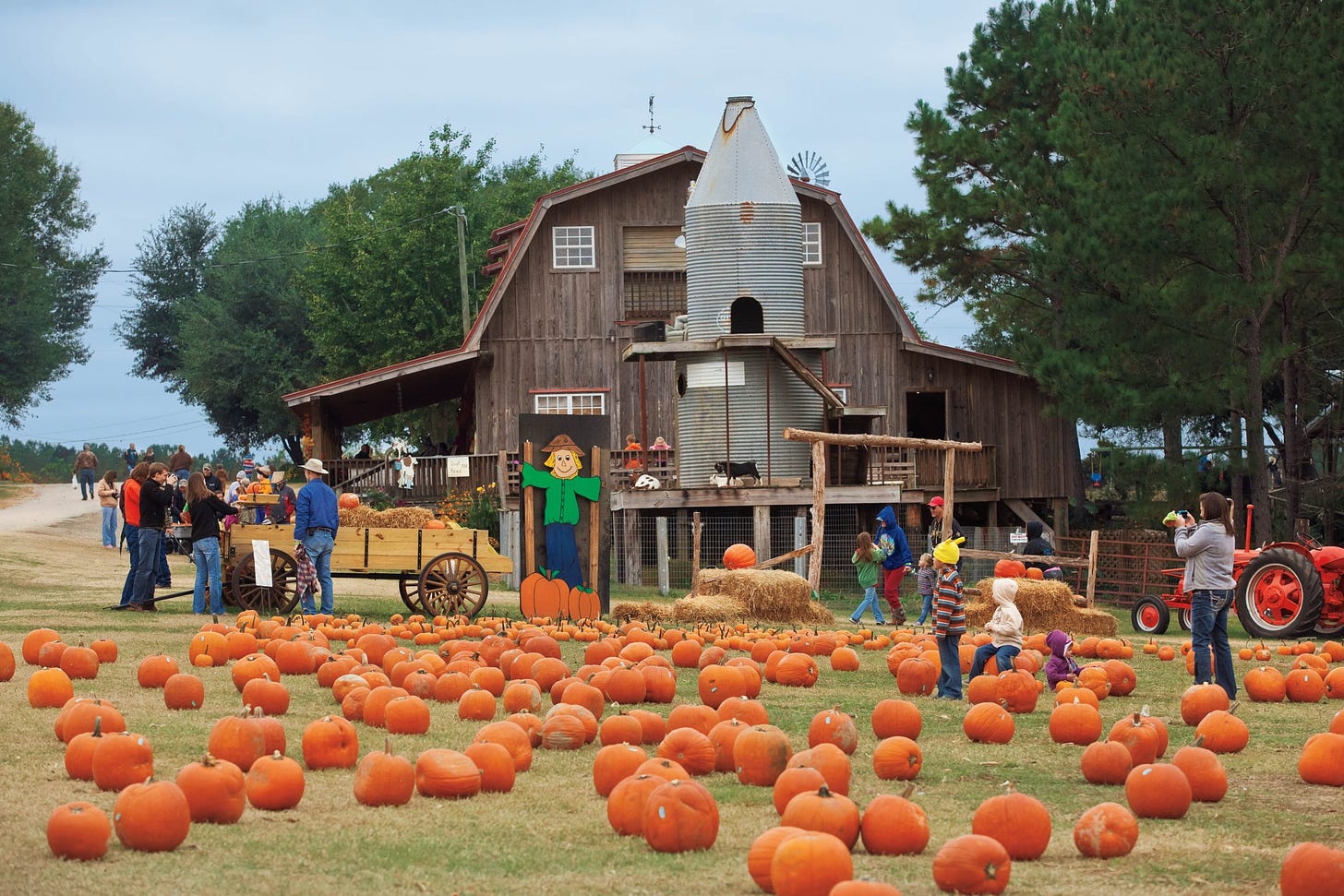
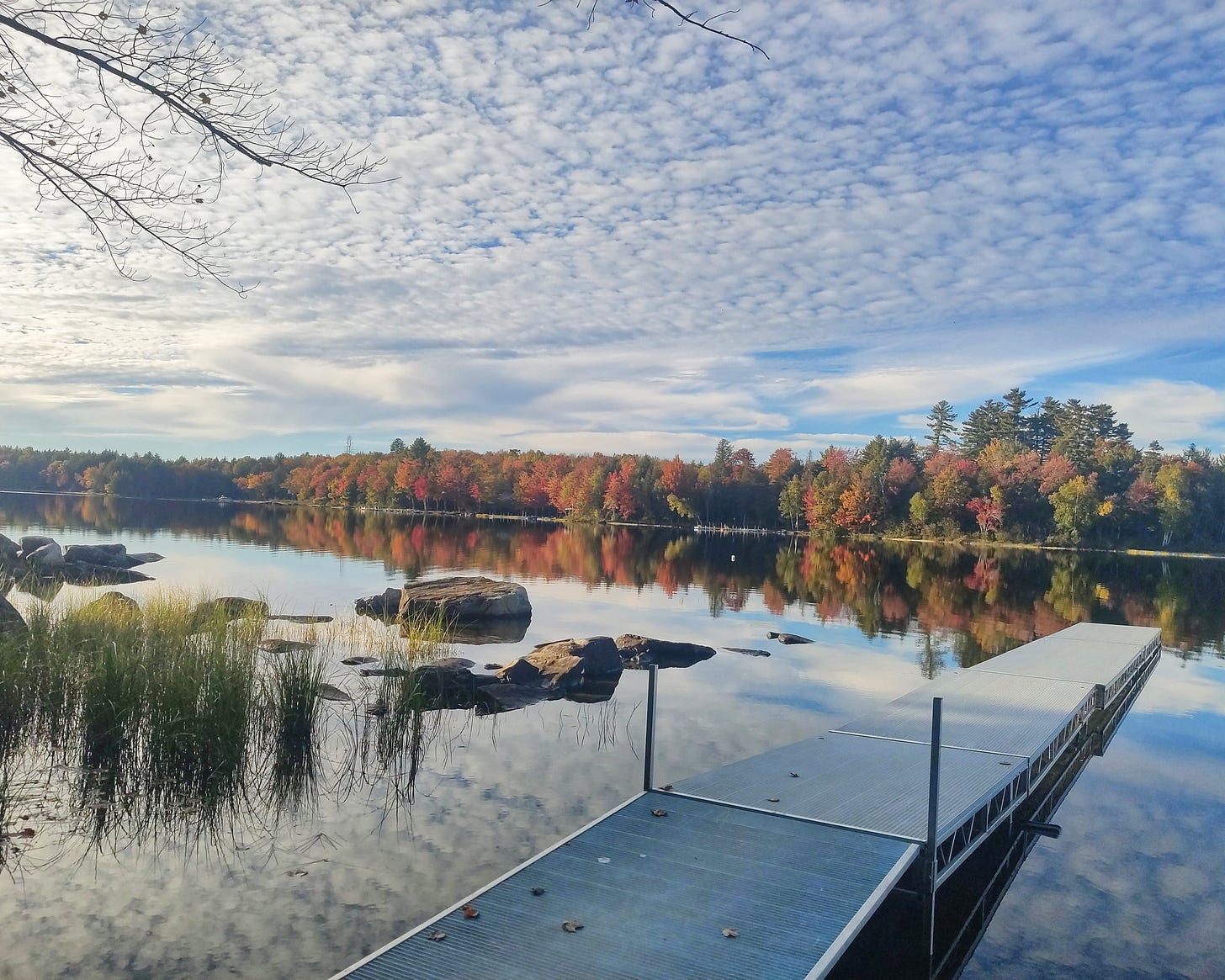

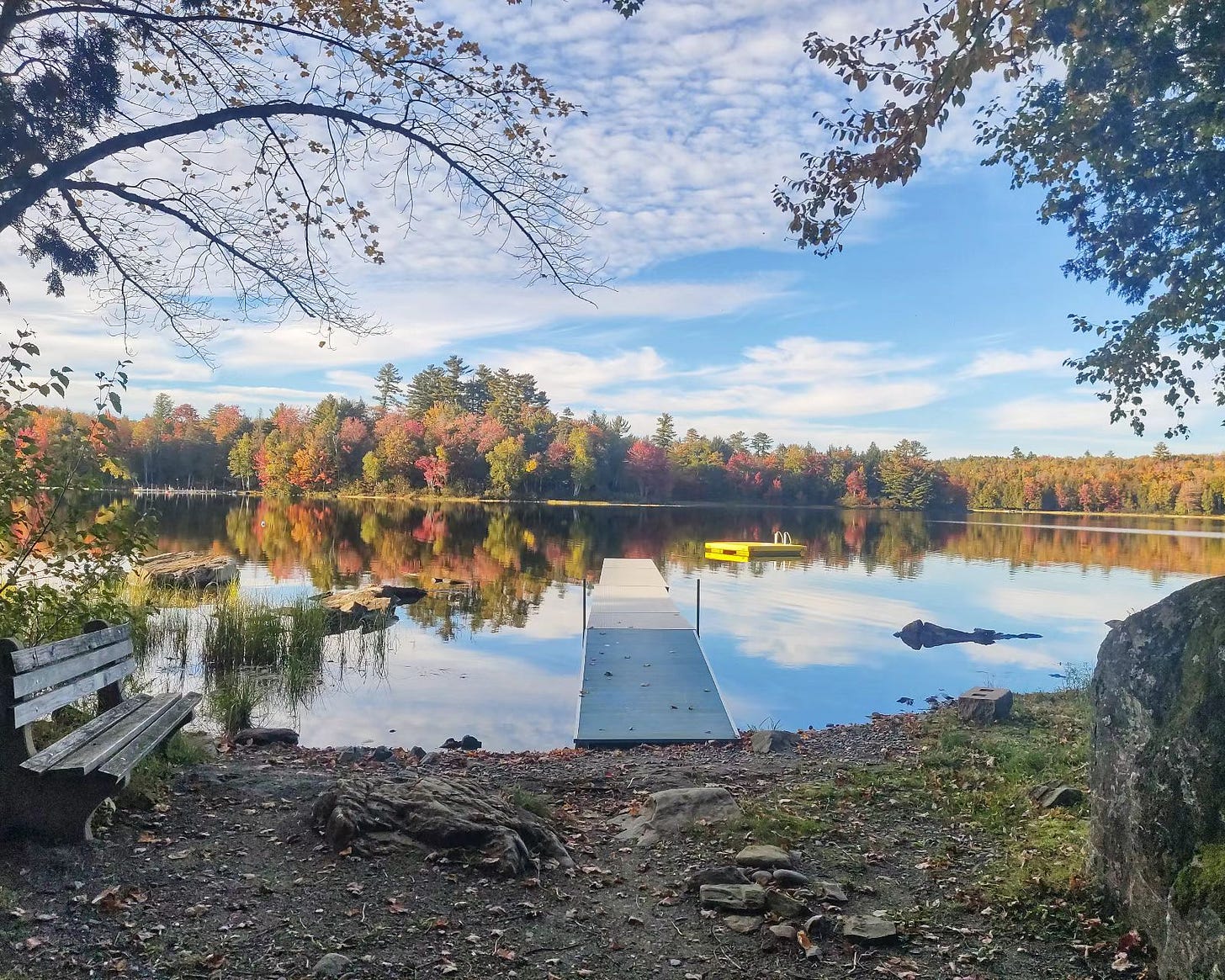
As someone who spent many happy months in Maine, thanks for the reminder.
I don't think it's fair to ask if Maine – or any other polity than China – could adopt its 'build it and they will come' approach, because no other polity can marshal the level of top-to-bottom support for a program like that.
Beijing has been hard-selling its village rejuvenation for some years, almost shaming city dwellers to support their country cousins by staying in their villages and visiting their waterfalls. The President and Prime Minister split up every year to visit exemplary (or pitiable) villages, and use their airtime to proselytize for country cousins. That support goes all the way down to the village Party Secretary, who has primary responsibility for getting with the program.
We're not in that league.
Great read. You are an excellent storyteller. Like one reader commented, the situation is very similar in Eastern Canada.
I really like the last section of your article, your accurate observations and questions raised. Looks like you have put a lot of thoughts in it.
There must be something to be learn between the two systems, Chinese and American. But for sure there is no single such a mould, even within China.